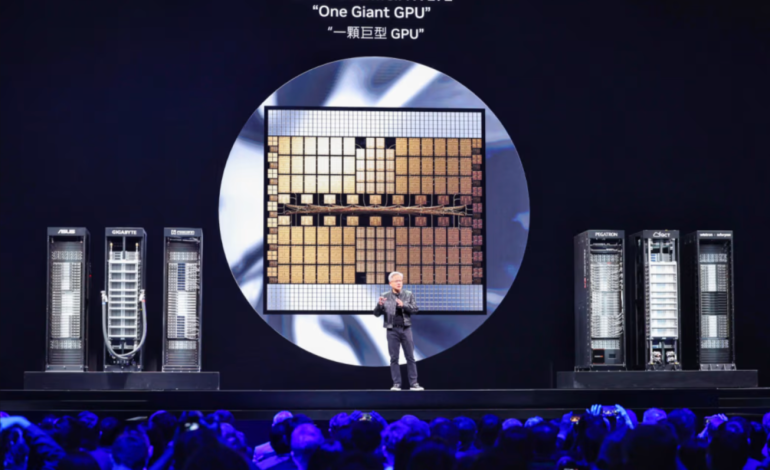Nvidia CEO Jensen Huang announced significant new investments in Taiwan on Monday, including the construction of a new headquarters in Taipei and the development of an artificial intelligence supercomputer.
The announcements were made during his keynote at Computex, one of Asia’s largest technology expos, held in Taipei.
Highlighting Taiwan’s critical role in the global tech supply chain, Huang described the island as “the center of the computer ecosystem” and “the largest electronics manufacturing region in the world.” The AI supercomputer project will be built in partnership with the Taiwanese government and Foxconn subsidiary Big Innovation Company. It will be powered by 10,000 of Nvidia’s cutting-edge Blackwell chips and support local research and development efforts, particularly those of key partner Taiwan Semiconductor Manufacturing Company (TSMC).
The new headquarters, dubbed “Constellation,” will be located in Taipei’s Beitou district. Designed as a futuristic structure, it reflects the company’s expanding footprint in the region and its growing role in global AI infrastructure.
These developments come as Nvidia balances expanding demand for AI technology with geopolitical tensions and shifting trade policies. The announcement follows recent efforts by the Trump administration to encourage more high-end tech manufacturing on US soil, while also managing export controls on AI chips—particularly those bound for China.
Despite these pressures, Huang emphasized Nvidia’s continued collaboration with Taiwanese companies such as Acer, Asus, Gigabyte, and TSMC. He also introduced several new technologies aimed at strengthening Nvidia’s position in the AI ecosystem. Among them is NVLink Fusion, a chip-to-chip communication platform that will be made available to external developers and adopted by firms such as MediaTek and Marvell.
The NVLink Fusion platform enables various chipmakers to build custom AI systems that integrate seamlessly with Nvidia GPUs, giving data center customers more flexibility. This marks a strategic shift, as Nvidia traditionally used its own components for such systems.
In addition, Nvidia launched DGX Spark and DGX Station—desktop AI systems designed to help developers train and deploy models locally before scaling them to data centers. The new offerings will be available within weeks, according to Huang.
Nvidia’s presence at Computex underscores its ambitions to remain central to the global AI revolution. As the company expands both in the US and abroad, Taiwan remains a pivotal partner in its growth strategy. The new investments are part of a broader global push, which also includes a $500 billion commitment over ten years to promote advanced manufacturing capabilities, particularly in the US.
While Huang did not confirm plans to modify Nvidia’s China-specific AI chip, the H20, he said the company is still evaluating how to approach the Chinese market under current export controls. He also dismissed concerns over the diversion of chips, stating there is “no evidence of any AI chip diversion” to restricted markets.
Huang’s visit to Taiwan follows a tour of the Middle East, where countries including Saudi Arabia and the UAE committed to multibillion-dollar AI infrastructure deals.
The Financial Times, Reuters, the Wall Street Journal, and Bloomberg contributed to this report.










The latest news in your social feeds
Subscribe to our social media platforms to stay tuned